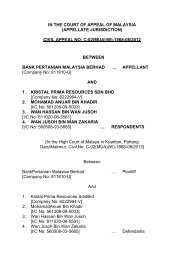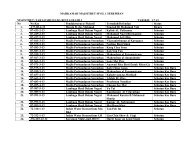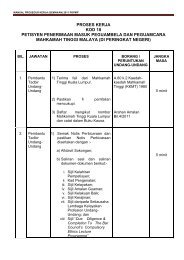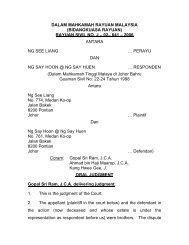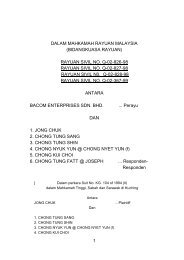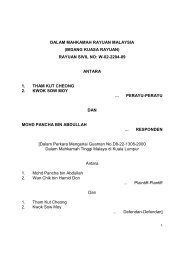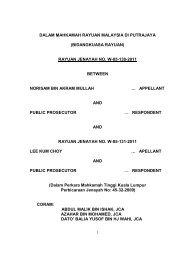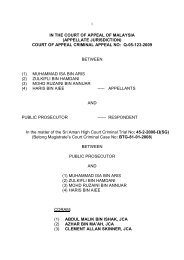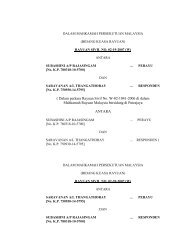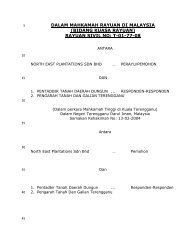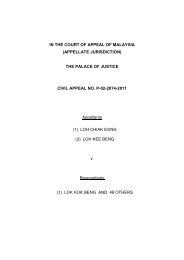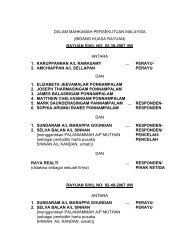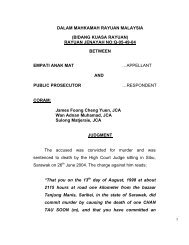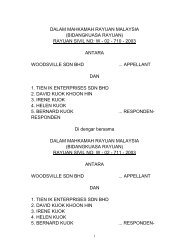in the court of appeal malaysia (appellate jurisdiction)
in the court of appeal malaysia (appellate jurisdiction)
in the court of appeal malaysia (appellate jurisdiction)
Create successful ePaper yourself
Turn your PDF publications into a flip-book with our unique Google optimized e-Paper software.
<strong>the</strong> start<strong>in</strong>g po<strong>in</strong>t <strong>in</strong> any case under s 459 will be to ask whe<strong>the</strong>r<br />
<strong>the</strong> conduct <strong>of</strong> which <strong>the</strong> shareholder compla<strong>in</strong>s was <strong>in</strong><br />
accordance with <strong>the</strong> articles <strong>of</strong> association.<br />
The answer to this question <strong>of</strong>ten turns on <strong>the</strong> fact that <strong>the</strong><br />
powers which <strong>the</strong> shareholders have entrusted to <strong>the</strong> board are<br />
fiduciary powers, which must be exercised for <strong>the</strong> benefit <strong>of</strong> <strong>the</strong><br />
company as a whole. If <strong>the</strong> board act for some ulterior purpose,<br />
<strong>the</strong>y step outside <strong>the</strong> terms <strong>of</strong> <strong>the</strong> barga<strong>in</strong> between <strong>the</strong><br />
shareholders and <strong>the</strong> company. As a matter <strong>of</strong> ord<strong>in</strong>ary<br />
company law, this may or may not entitle <strong>the</strong> <strong>in</strong>dividual<br />
shareholder to a remedy. It depends upon whe<strong>the</strong>r he can br<strong>in</strong>g<br />
himself with<strong>in</strong> one <strong>of</strong> <strong>the</strong> exceptions to <strong>the</strong> rule <strong>in</strong> Foss v<br />
Harbottle (1843) 2 Hare 461. But <strong>the</strong> fact that <strong>the</strong> board are<br />
protected by <strong>the</strong> pr<strong>in</strong>ciple <strong>of</strong> majority rule does not necessarily<br />
prevent <strong>the</strong>ir conduct from be<strong>in</strong>g unfair with<strong>in</strong> <strong>the</strong> mean<strong>in</strong>g <strong>of</strong> s<br />
459. Enabl<strong>in</strong>g <strong>the</strong> <strong>court</strong> <strong>in</strong> an appropriate case to outflank <strong>the</strong><br />
rule <strong>in</strong> Foss v Harbottle was one <strong>of</strong> <strong>the</strong> purposes <strong>of</strong> <strong>the</strong> section.<br />
So <strong>in</strong> Re a Company (No 00370 <strong>of</strong> 1987), ex p Glossop [1988]<br />
BCLC 570, [1988] I WLR 1068, where <strong>the</strong> compla<strong>in</strong>t was <strong>of</strong> a<br />
consistent refusal by <strong>the</strong> board to recommend payment <strong>of</strong> a<br />
dividend, Harman J said that such conduct could make it just<br />
and equitable to w<strong>in</strong>d up <strong>the</strong> company. He did so by reference<br />
to <strong>the</strong> sem<strong>in</strong>al judgment <strong>of</strong> Lord Wilberforce <strong>in</strong> Howard Smith<br />
Ltd v Ampol Petroleum Ltd [1974] I All ER 1126, [1974] AC<br />
821 on <strong>the</strong> pr<strong>in</strong>ciples by which <strong>the</strong> <strong>court</strong> decides whe<strong>the</strong>r <strong>the</strong><br />
conduct <strong>in</strong> question could justify a just and equitable w<strong>in</strong>d<strong>in</strong>g<br />
up and also whe<strong>the</strong>r it is unfair for <strong>the</strong> purposes <strong>of</strong> s 459. ....<br />
Although one beg<strong>in</strong>s with <strong>the</strong> articles and <strong>the</strong> powers <strong>of</strong> <strong>the</strong><br />
board, a f<strong>in</strong>d<strong>in</strong>g that conduct was not <strong>in</strong> accordance with <strong>the</strong><br />
articles does not necessarily mean that it was unfair, still less<br />
that <strong>the</strong> <strong>court</strong> will exercise its discretion to grant relief. There is<br />
<strong>of</strong>ten sound sense <strong>in</strong> <strong>the</strong> rule <strong>in</strong> Foss v Harbottle (1843) 2 Hare<br />
461. In choos<strong>in</strong>g <strong>the</strong> term ‘unfairly prejudicial’, <strong>the</strong> Jenk<strong>in</strong>s<br />
Committee (para 204) equated it with Lord Cooper’s<br />
understand<strong>in</strong>g <strong>of</strong> ‘oppression’ <strong>in</strong> Elder v Elder and Watson<br />
1952 SC 49:<br />
‘a visible departure from <strong>the</strong> standards <strong>of</strong> fair deal<strong>in</strong>g and<br />
a violation <strong>of</strong> <strong>the</strong> conditions <strong>of</strong> fair play on which every<br />
37



